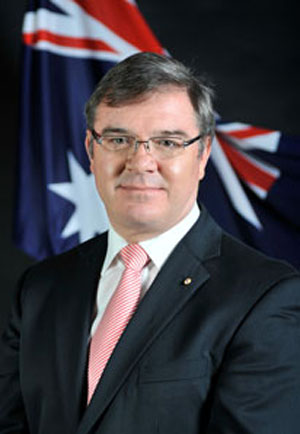Gershon funds keep taxes low: Gray

Pushing ICT savings from the implementation of the Gershon Review back into government revenue rather than allocating them specifically to new ICT investments keeps taxes low, according to Special Minister of State Gary Gray.

Gary Gray (Credit: Federal Government)
"The Gershon savings were designed to reduce government outlays so that savings get redirected into government that keep taxes low; that reduces the government footprint on the economy — that's a good thing," he told ZDNet Australia. "The whole of the context of government engagement around ICT is to deliver government better, to be innovative in delivery of government services and to reduce the cost for delivery of government."
In the 2010 Federal Election campaign, Prime Minister Julia Gillard redirected half a billion dollars in savings made from implementing Sir Peter Gershon's recommendations on government IT back into government revenue. The savings had previously been earmarked for IT projects, as a reward for cutting costs.
Gray, who was appointed to be special minister of state overseeing the Australian Government Information Management Office after the election, said that despite the gouging of the Gershon funds, the government was investing heavily in ICT, and pointed to the recent IT announcements in the federal budget.
"We've got a billion dollars of ICT procurement in the current budget, we've got the Gershon review and Ian [Reinecke]'s observations of that, we have the current engagement taking place around vision of ICT and AGIMO, and that's a valued conversation. One that we pay attention to," he said.
However, Ovum's public sector research director Kevin Noonan said that normal budget funding for ICT is not the same as what Gershon proposed for the spending.
"There is always a significant amount of ICT in each budget as you look under the covers, and this is always the case. The Gershon money, particularly given the specific recommendations of Gershon that there would be a process for modernising IT, had a particular purpose in mind," he said.
"[Gershon] noted that too much money was being spent on maintenance, and that was probably true, but in order to reduce that maintenance load, it does require some strategic investments to make the IT more effective, not just more efficient.
"You can't just cut money without starting to look at ways of doing things differently."
Gray said that although seven months had passed since the handing down of the report, the government was still considering the findings of the Reinecke review.
No "Soviet-style" IT
The special minister of state was in agreement with Department of Human Services' IT head John Wadeson that the infrastructure consolidation being carried out within that department could not be applied across government, "Soviet-style".
"One of the defining characteristics of being successful in the ICT space is not to presume that a Soviet-style five-year plan or a one-solution-fits-all is going to be successful — it won't be," he said. "Innovation will come from uses in even the smallest of government agencies that then become insightful for the largest."
E-government champions
At the unveiling of the Federal Government's National Digital Economy Strategy, 20 "broadband champions" were announced that target specific areas such as health and education, which the government believes will benefit from the roll-out of the National Broadband Network (NBN). Australian Information Industry Association (AIIA) CEO Ian Birks noted that the list was missing an e-government champion; however, Gray said that the government itself would have this role.
"I am a strong advocate of that. Stephen [Conroy] views that as important; he is a strong advocate of that. Julia [Gillard] is a strong advocate of that. So I think the government has good, strong leadership in the whole of that agenda and I'm pleased to have that as part of my portfolio," he said. "Kate Lundy, who isn't related to my portfolio but has strong views, genuine insight and great energy, is a valuable contributor on that front as well.
"So, I'm quite confident that although we don't have a sort of e-commissar, we have a big view about how we better do what we're doing."